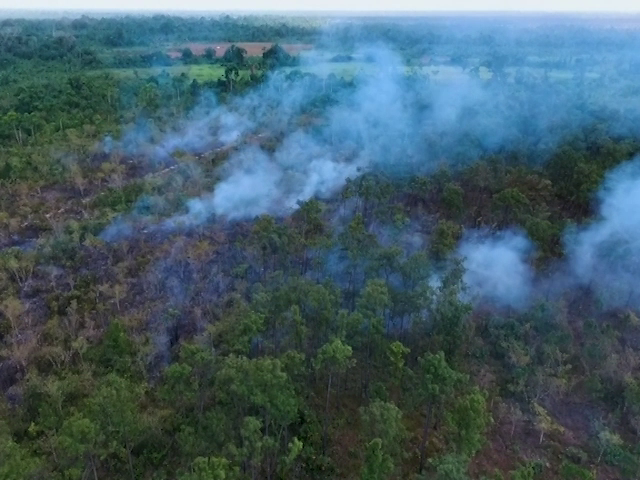Wildfires have destroyed more than six hundred acres of farmland in Toledo District over the past three weeks. An initial damage assessment conducted by the National Emergency Management Organization estimates over three million dollars in losses. More than two hundred families have been affected, the equivalent of just under a thousand residents. They describe these events as the worst they have seen in their lifetime. Compounding the challenges brought on by wildfires is an extensive period of drought and little to no access to water in some villages. News Five’s Paul Lopez traveled to Toledo today. He filed the following reports.
Paul Lopez, Reporting
Over six hundred acres of farmland, in addition to a vast expanse of forest, have been destroyed by wildfire in Toledo District.
Novelo Chiac, Blue Creek Village Resident
“That is our, that is where we get our food and we call it our home because we get our lumber there and stuff for our house.”
This is Novelo Chiac, a resident of Blue Creek Village in Toledo District. For the past two weeks, wildfires have been burning through his community.
Novelo Chiac
“Last week Friday the fire reached close to neighbors on this side and we couldn’t find no help.”
“Is this the worst you have ever seen?”
Novelo Chiac
“This is the worst one, yeah.”
Wildfires are not uncommon in these parts at this time of year. But increased temperatures, coupled with the absence of rainfall for more than a month, have led to a wildfire fire crisis in Toledo. We came across a brushfire that was growing quickly on a hillside in Blue Creek. Most of the hilly terrain in this community is covered with lush rainforest. At the foot of this hill, one family was on high alert as the fire threatened to destroy their life’s work.
Voice of: Nelson, Blue Creek Resident
“This has been an area that my dad has invested in. You can see a lot of cacao trees, coconut trees. So what I went and did earlier was try to create a little path as close as I can to it so that in case it reaches down we have our little spray pump there, assuming that it wouldn’t get as big as how it is in other areas around that side.”
Voice of: Nelson
“It is a little hard because it is dry, everything is dry but we are trying to salvage what we can because this is the daily livelihood of us here in the village and we rely on this house. This thatch house, it may look small and thing but that is somebody’s home and that is where somebody is living but it means a lot to them.”
West of Blue Creek lies Santa Cruz Village. Both communities are separated by the flaming hills. Francisco and his family live in the village on of top a hill that provides a panoramic view of the smoke-filled horizon and scorched earth. Overwhelmed by the smoke in the air, Francisco has had to relocate his wife and children several times over the past few weeks. His experience has been similar to that of his neighbors.
Voice of: Francisco, Santa Cruz Village Resident
“Deh same farm pumps we use to do chemicals in the farm and the five gallons to go for water wherever we could find water source. We don’t have specific like the water system is down foe the moment, not down to say that it is not working but we are out of water under the ground so we don’t have that much availability of water anywhere around close.”
Voice of: Francisco
“To me that is something that could be dealt with with some type of care. The thing is with slash and burn is that we as the farmers we depend on those and that is our main source of food. Without those, if we can’t do that then we can’t plant crop this year. I think the solution to that is when there is slash and burn it shouldn’t just be one person out there to do the slash and burn we need to ensure there is enough water around and man to out the fire if it goes out and off thr limit. And before that we need to make sure we do the fire pass around it and make sure it is wide enough not to pass the fire to the other side.”
“I would hope that out leaders would come together just like they did for the COVID19 regulations and implement it and be strict about it. We are destroying this environment. What will we have for the future?”
Reporting for News 5, I am Paul Lopez.
